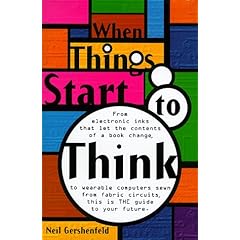This is one of my favourite non-fiction books which I reviewed when it came out but have updated.
When Things Start to Think by Neil Gershenfeld – 1999
 This amazing book by Neil Gershenfeld the director of the Center for Bits and Atoms at the Massachusetts Institute of Technology was so futuristic when it was written in 1999 that we are still waiting for many of his predictions to come true.
This amazing book by Neil Gershenfeld the director of the Center for Bits and Atoms at the Massachusetts Institute of Technology was so futuristic when it was written in 1999 that we are still waiting for many of his predictions to come true.
The book was written while Gershenfeld was the co-director of the Things That Think project at the MIT Media Laboratory. Here he was exposed to futuristic technologies on a daily basis and so gained an insight into the world of technology to come.
For example if you think the current state of computing is pretty advanced, what about a computer in your shoe that can communicate intelligently with others ‘wired’ footwear when you pass by on the street? Or the printer which produces three dimensional ‘printouts’ which will be your personal desktop factory.
My favourite chapter concentrated on the future of the book (surely a topic close to many of our hearts). He describes an electronic book containing around twenty or so pages of digital paper ‘printed’ using computerised ink. The text and images can be refreshed from the inbuilt memory or downloaded from the internet. The pages are fixed on the page and don’t disappear when the power is turned off. The real challenge for the technologists is to produce a page that has the readability as existing printed text. Gershenfeld spends several pages detailing just what a fantastic medium the ‘old’ technology of the printed page is for acquiring information. A book can contain a vast amount of information, you can jump to any page almost instantly, your can read it in the poorest of light, it needs no power and it is remarkably cheap when produced in large volumes.
I like the way the books is written in a chatty non-technical style with lots of clear and simple explanations, which is a rare ability in a technologist. Also, despite having seen quantum leaps in computing in over the years Gershenfeld realises there is still a long way to go before computers can be regarded as intelligent. Humans shouldn’t have to adapt to computers – it should be the other way around. For instance does your computer even know when you are sitting in front of it, let alone what kind of mood you are in, or how hungry or tired your are.
However I believe that Gershenfeld does fall into the scientists traditional mistake of thinking that we will reach a kind of technological nirvana. He fails to note examples from history where scientific developments have been abused to the detriment of humankind. For example, on the one hand we have nuclear power and genetically engineered medicines but on the other nuclear bombs and chemical warfare.



 This amazing book by Neil Gershenfeld the director of the Center for Bits and Atoms at the Massachusetts Institute of Technology was so futuristic when it was written in 1999 that we are still waiting for many of his predictions to come true.
This amazing book by Neil Gershenfeld the director of the Center for Bits and Atoms at the Massachusetts Institute of Technology was so futuristic when it was written in 1999 that we are still waiting for many of his predictions to come true. Wikipedia is a registered charity which cost $1 million in 2007 and forecasted to cost $2-3 million in 2008 which is amazing considering it is now the 8th most popular website in the world. Even in Iran it is the 14 most popular.
Wikipedia is a registered charity which cost $1 million in 2007 and forecasted to cost $2-3 million in 2008 which is amazing considering it is now the 8th most popular website in the world. Even in Iran it is the 14 most popular.

